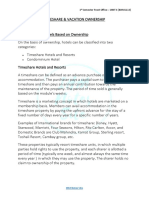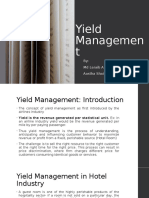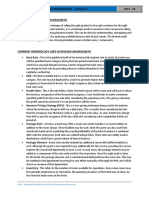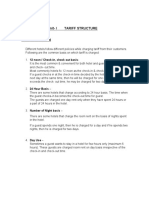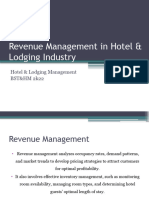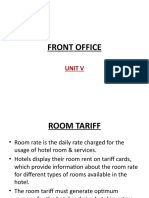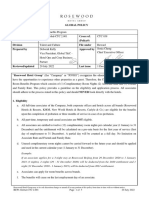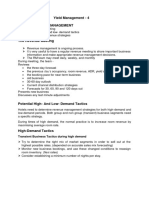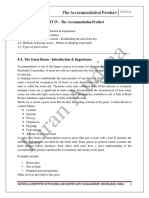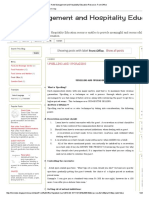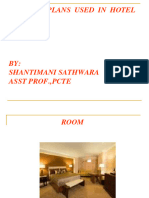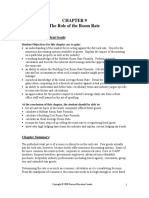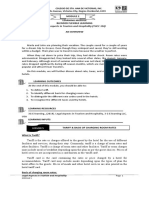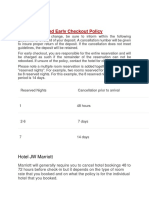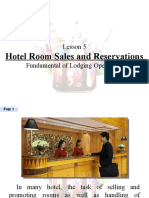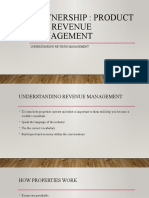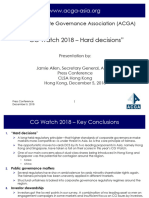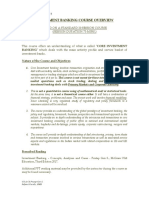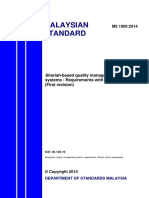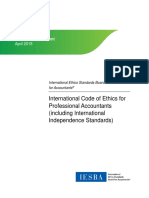Allotment
Allotment
Uploaded by
JimmySkipperCopyright:
Available Formats
Allotment
Allotment
Uploaded by
JimmySkipperOriginal Description:
Copyright
Available Formats
Share this document
Did you find this document useful?
Is this content inappropriate?
Copyright:
Available Formats
Allotment
Allotment
Uploaded by
JimmySkipperCopyright:
Available Formats
NZ Hotel Council/Inbound Tour Operator Council
INDUSTRY TERMINOLGY & BEST PRACTICE
Best practice guidelines and terminology used in the accommodation and inbound tour operator sectors
TERMINOLOGY
Seasonality
DEFINITION
Allotments
High and low season, national and regional focus with
exceptions for special interest e.g. Rugby World Cup 2011
The differing rate seasons within the validity of a contract, for
example a contract with the validity of 01 Apr 05 31 Mar 06
may have differing seasonality within those date frames where
the rate varies, 01 April 30 Sep 05 may be at a low season
rate and 01 Oct 31 Mar 06 may be at a high season rate.
What is given in an allocation of rooms by the hotel to be
maintained and managed by tour operator
An allocated number of rooms that are pre-agreed between
the hotel and the IBO are allotted to the IBO and become the
IBOs rooms to sell. There is a negotiated release back period
when if these rooms are not sold XX amount of pre-agreed
days prior to eventuation, they are released back to the hotel
and are no longer the IBOs rooms to sell.
Standard practise is that the contract will specify an automatic
release date that will trigger the return of rooms and show up
in that hotels systems
H/ITOC/NZHC/ITOC MOU Inventory Issues
BEST PRACTICE
Differing trading periods depending on
seasons and locations.
High season (Oct-Apr) and Low season
(May-Sep)
with
allowances
for
exceptions for special events and
regional variations (i.e. ski season).
Standard wholesale rates but keep them
simple.
Considered a contract between
accommodation supplier and tour
operator.
Hotel should always ask IBO if they
need to request return of rooms by
mutual agreement with disciplines in
place tied to pre-agreed rate and
conditions.
All requests will be responded to in a
reasonable manner by both parties.
Once an allocation is set up with any
close out dates advised at time of set
up, no further close out dates should be
made by the hotel/accepted by the IBO
TERMINOLOGY
DEFINITION
BEST PRACTICE
Cancellations
Group
Standard practise is for IBO to provide hotel with final
rooming list at 30 days prior to arrival. Unless stated in the
contract between IBO and hotel, no cancellation fee applies
outside this time. Cancellation fees (usually the first night) will
be charged if they are any time within 30 days.
Contracts to state the number of
rooms (usually up to 20%) that may
be reduced from an allotment outside
30 days without attracting cancellation
fees.
FIT
Depending on the location and season, cancellation fees may
not apply if advised 24-48 hours prior to arrival.
Cancellation policies to be based on
the contract between the hotel and
IBO.
Free Sell
Right to sell under specified agreed conditions, rate, number of
rooms, by market segment
An agreement between the IBO and the hotel that the IBO is
permitted to confirm an unlimited number of rooms to their
clients without seeking a confirmation from the hotel. The IBO
sells the room and reports it as sold to the hotel and the hotel
is bound to honour this booking. The hotel has the right to
advise of black out or stop sell dates when the IBO is no
longer permitted to free sell during those dates. The IBO is
required to sign and send back any blackout/stop sell advice
before the stop sell/blackout can be enforced.
Regular updates and communication between hotel and IBO
Without restriction under agreed terms
until advised otherwise, in other words
the hotel is full.
Agreed rate expressly negotiated for a specific purpose and
never to be disclosed and by either party to a wholesaler,
consumer or other IBO partner on a standalone basis.
Rates are negotiated on the understanding that they are
specifically and only for an agreed printed brochure, campaign
or inclusion in an itinerary unless agreed otherwise at the
outset.
Package and rate not disclosed.
If an IBO willingly or knowingly uses the
agreed special-purpose rate for another
purpose, the hotel has the right to
decline and apply normal wholesale
rates.
Brochured
Product Rates
H/ITOC/NZHC/ITOC MOU Inventory Issues
TERMINOLOGY
Release back
Policy
DEFINITION
Materialisation
Waitlist
BEST PRACTICE
Applies when contract for allotment is not met e.g. within the
number of days specified in the contract.
The policy is jointly agreed between the hotel and the IBO for
the automatic release back of unsold allocated rooms from the
IBO to the hotel. In some cases it is also the time that sold
rooms are reported.
Standard policy is that at the time of booking the IBO advises
the hotel that the booking is ex-allotment. Once the specified
date has been reached any unsold rooms from the allotment
are automatically released back to the hotel.
Number of rooms actually used versus number of rooms
booked or allocated.
Group bookings are usually quoted a long time in advance,
often with space held for the groups, so the materialisation of
group bookings means the % rate of how many quoted
bookings materialise into actual bookings.
Encourages matching inventory against business achieved.
In the event a hotel cannot confirm rooms to IBO, the IBO can
seek rooms at alternative similar standard hotel to cover
waitlist.
H/ITOC/NZHC/ITOC MOU Inventory Issues
If tour operator sells fewer rooms than
those agreed to, release back policy
applies.
Good communication between IBO and
hotel.
Hotels to review on a regular basis.
Good two way communication based on
trust and agreed process.
Hotels to manage inventory with
controls, measurement processes and
systems in place.
Hotels reserve the right to increase,
review, decrease or retain allocations at
the start of each season. The benchmark
is
that
hotels
will
seek
50%
materialisation per room.
Minimum number of hotels booked to
cover waitlist.
Release duplicated rooms as soon as
practical.
TERMINOLOGY
Best Practice
Standards when
NZHC member
sells to overseas
wholesaler on a
direct basis
DEFINITION
NZHC rates to ITOC tour operators based on a commercial
decision taking into account, volume, type of business,
potential, seasonality, trading practices and business
relationship.
BEST PRACTICE
Abbreviations:
ARR
Average room revenue divided by number of rooms sold
RevPar
Room revenue divided by number of available rooms
IBO
Inbound Tour Operator
FIT
Free Independent Traveller
VFR
Visit Friends and Relatives
H/ITOC/NZHC/ITOC MOU Inventory Issues
NZHC members recognise the added
value ITOC members bring to the
international travel distribution chain.
Hotels accept that IBOs need to work on
a margin and recognise this when
offering rates to off-shore wholesalers.
Hotel room rates to be finalised year
following TRENZ and applicable from
April 1 the following year to March 31.
You might also like
- Project On Accounting EThicsDocument40 pagesProject On Accounting EThicsChidi EmmanuelNo ratings yet
- Timeshare and Vacation OwnershipDocument6 pagesTimeshare and Vacation Ownershiprajesh kumar100% (1)
- SOP - SalesDocument17 pagesSOP - Salestomzayco100% (1)
- Establishing Room RateDocument5 pagesEstablishing Room RatePiyush AgarwalNo ratings yet
- Reservation: Availability. Below Is The Detailed Process of ReservationDocument8 pagesReservation: Availability. Below Is The Detailed Process of ReservationgiannosforNo ratings yet
- Advertising For CPA PractitionersDocument8 pagesAdvertising For CPA PractitionersJim M. MagadanNo ratings yet
- Methods Adopted For Evaluating Performance of Operations: Room Division NotesDocument9 pagesMethods Adopted For Evaluating Performance of Operations: Room Division NotesCarzo Aggy MugyNo ratings yet
- Yield Managemen T: By: MD Laraib Ahsan Aastha ShaileeDocument18 pagesYield Managemen T: By: MD Laraib Ahsan Aastha ShaileeLaraibNo ratings yet
- UNIT 1 - Planning & Evaluating OperationsDocument22 pagesUNIT 1 - Planning & Evaluating OperationsGurneet Singh7113No ratings yet
- UNIT 1 - ReservationDocument99 pagesUNIT 1 - ReservationHigneh FantahunNo ratings yet
- Reference Notes - Revenue Management and Accommodation StatisticsDocument4 pagesReference Notes - Revenue Management and Accommodation StatisticsVedant HingeNo ratings yet
- Room Tariff StructureDocument9 pagesRoom Tariff StructurenevilleatnibrNo ratings yet
- Unit 1 TARIFF STRUCTURE FO Notes by Priya Sharma March 2020Document8 pagesUnit 1 TARIFF STRUCTURE FO Notes by Priya Sharma March 2020madhu anvekarNo ratings yet
- Revenue Management in Hospitality IndustryDocument22 pagesRevenue Management in Hospitality Industrysejekaf397No ratings yet
- First City Providential College: Rate DesignationsDocument25 pagesFirst City Providential College: Rate DesignationsAngel BambaNo ratings yet
- Pricing Strategies of Oberoi HotelsDocument6 pagesPricing Strategies of Oberoi HotelsPooja NagarNo ratings yet
- FRONT OFFICE Unit 5Document16 pagesFRONT OFFICE Unit 5Gyani PanditNo ratings yet
- REW-Global-CTC 2.001 Room Benefits ProgramDocument5 pagesREW-Global-CTC 2.001 Room Benefits ProgramfariasNo ratings yet
- Terminologies IDocument23 pagesTerminologies IYani SalvadorNo ratings yet
- Pricing Strategies of Oberoi HotelsDocument6 pagesPricing Strategies of Oberoi HotelsRaj MohanNo ratings yet
- Front Office AssignmentDocument7 pagesFront Office AssignmentC.bharath chandranNo ratings yet
- Unit 1 - Room TariffDocument18 pagesUnit 1 - Room TariffMandeep Kaur100% (2)
- Different Rate and Hubbert FormulaDocument4 pagesDifferent Rate and Hubbert FormulaNiharNo ratings yet
- CHAPTER 12 (Understanding Legal Issues in The MEEC Industry) RoseDocument35 pagesCHAPTER 12 (Understanding Legal Issues in The MEEC Industry) RosePatrick RiveraNo ratings yet
- Yield Management in Hotel IndustryDocument11 pagesYield Management in Hotel Industryvineet saraff100% (1)
- Yield Management: IHM Lucknow Faculty NotesDocument15 pagesYield Management: IHM Lucknow Faculty NotesHimanshuNo ratings yet
- Front OfficeDocument16 pagesFront OfficeSukriti DasNo ratings yet
- Scope of The Code of PracticeDocument5 pagesScope of The Code of PracticemuiticaNo ratings yet
- Lesson 5 EditedDocument14 pagesLesson 5 EditedMichael AndersonNo ratings yet
- Hotel Reservation and ReceptionDocument22 pagesHotel Reservation and ReceptionJi Ni BibNo ratings yet
- New PPT Unit 1.1Document44 pagesNew PPT Unit 1.1Rachna PokhriyalNo ratings yet
- Tariff and Basis of ChargingDocument6 pagesTariff and Basis of ChargingmdNo ratings yet
- Unit-1 High and Low Demand TacticsDocument7 pagesUnit-1 High and Low Demand TacticsYash RajNo ratings yet
- Types of Rack RatesDocument26 pagesTypes of Rack RatesSunil KumarNo ratings yet
- Unit-1 Tariff Structure: Content 1.1 1.2 1.3 1.4 1.5 Different Types of Room Rate/ Tariff 1.1 Tariff CardDocument11 pagesUnit-1 Tariff Structure: Content 1.1 1.2 1.3 1.4 1.5 Different Types of Room Rate/ Tariff 1.1 Tariff CardRohan PandeNo ratings yet
- Prelim. Module 2. Lesson 5 - 8 Rate, Tax, and Expenses (Legal Aspects) PDFDocument6 pagesPrelim. Module 2. Lesson 5 - 8 Rate, Tax, and Expenses (Legal Aspects) PDFMARITONI MEDALLANo ratings yet
- Reservation PDFDocument18 pagesReservation PDFUtkarsh NagNo ratings yet
- UNIT IV - The Accommodation Product Notes PDFDocument16 pagesUNIT IV - The Accommodation Product Notes PDFKiran audinaNo ratings yet
- Hotel Management and Hospitality Education ResourceDocument23 pagesHotel Management and Hospitality Education ResourceponavnitNo ratings yet
- Eda PowerpointDocument30 pagesEda PowerpointRohit SharmaNo ratings yet
- 3rd Yr Chapter 2Document7 pages3rd Yr Chapter 2122 - M BhumishNo ratings yet
- ReservationDocument151 pagesReservationAbdul Basheer Ahamad BaigNo ratings yet
- TariffDocument25 pagesTariffMic CelisNo ratings yet
- Vallen Check 2ce Im ch09 PDFDocument6 pagesVallen Check 2ce Im ch09 PDFShweta MathurNo ratings yet
- Rooms and DivisionDocument21 pagesRooms and Divisionmarielle jelyn villegasNo ratings yet
- Module 2. Rate, Tax, and Expenses (Legal Aspects)Document13 pagesModule 2. Rate, Tax, and Expenses (Legal Aspects)MARITONI MEDALLANo ratings yet
- Front OfficeDocument27 pagesFront Officeakshay chauhanNo ratings yet
- Reservation&Room Selling ProceduresDocument30 pagesReservation&Room Selling ProceduresSunil KumarNo ratings yet
- ReferencessssssssDocument5 pagesReferencesssssssssarah.naanaNo ratings yet
- Hotel Payment Receipt HTLQV4 LWU4Document5 pagesHotel Payment Receipt HTLQV4 LWU4Amit GargNo ratings yet
- Hotel Booking Analysis SakshiDocument15 pagesHotel Booking Analysis SakshiNilesh yadavNo ratings yet
- Cancellation Policy Tejas Chavan s19Document3 pagesCancellation Policy Tejas Chavan s19Tejas ChavanNo ratings yet
- Flo5-Room Sales and Reservation 2Document45 pagesFlo5-Room Sales and Reservation 2raul m partozaNo ratings yet
- Tour and Travel ManagementDocument34 pagesTour and Travel ManagementMike AnagNo ratings yet
- Eda Powerpoint3Document26 pagesEda Powerpoint3Devendra kushwahNo ratings yet
- Understanding Revenue ManagementDocument22 pagesUnderstanding Revenue ManagementKhun KhunNo ratings yet
- APRIL 25, 2020: Primeasia University Department of International Tourism & Hospitality ManagementDocument18 pagesAPRIL 25, 2020: Primeasia University Department of International Tourism & Hospitality ManagementArman RahmanNo ratings yet
- Group 7 Revenue Management - PPTMDocument17 pagesGroup 7 Revenue Management - PPTM愛ラriaNo ratings yet
- Club Florence SOP Front Office: 2 Making A ReservationDocument8 pagesClub Florence SOP Front Office: 2 Making A ReservationHimanshu SinghNo ratings yet
- Unit - 3 ReservationsDocument17 pagesUnit - 3 ReservationsFazal KakakhelNo ratings yet
- Handbook of Contract Management for Construction professionals as per FIDICFrom EverandHandbook of Contract Management for Construction professionals as per FIDICRating: 5 out of 5 stars5/5 (1)
- Workplace Safety and Health (Safety and Health Management System and Auditing) Regulations 2009Document12 pagesWorkplace Safety and Health (Safety and Health Management System and Auditing) Regulations 2009alexNo ratings yet
- Course Out Line MBFI 12-14Document3 pagesCourse Out Line MBFI 12-14chitu1992No ratings yet
- CG Watch 2018 - ACGA' S PresentationDocument34 pagesCG Watch 2018 - ACGA' S PresentationolanNo ratings yet
- واقع الجهاز المصرفي الجزائري بين متطلبات لجنة بازل - 2 - وتحديات تطبيق بازل - 3 -Document15 pagesواقع الجهاز المصرفي الجزائري بين متطلبات لجنة بازل - 2 - وتحديات تطبيق بازل - 3 -Nada NadaNo ratings yet
- Book 2 UtopiaDocument4 pagesBook 2 UtopiaNeculaes IonutNo ratings yet
- Pile cp18Document3 pagesPile cp18casarokarNo ratings yet
- Mitsui Construction Co LTD V A-G of Hong Kon (Overview)Document4 pagesMitsui Construction Co LTD V A-G of Hong Kon (Overview)Mazuan LinNo ratings yet
- NEC 3 - When Is The Project Manager Obliged To Notify A Compensation Event, and What Are The Effects of His Failure To Do SoDocument3 pagesNEC 3 - When Is The Project Manager Obliged To Notify A Compensation Event, and What Are The Effects of His Failure To Do SoPaul MaposaNo ratings yet
- Standards On Internal Audit ('Sia')Document11 pagesStandards On Internal Audit ('Sia')VaspeoNo ratings yet
- The Philippine Business EnterpriseDocument20 pagesThe Philippine Business EnterpriseMafe Marquez50% (2)
- CBL Aml Questionnaire DataDocument17 pagesCBL Aml Questionnaire DataGeorgio RomaniNo ratings yet
- OHSAS180012007 Health Safety Management System ManualDocument36 pagesOHSAS180012007 Health Safety Management System ManualCandra Wae Lah100% (3)
- Investment Banking Course OutlineDocument4 pagesInvestment Banking Course OutlineSaksham GoyalNo ratings yet
- Articles of Incorporation and by Laws Non Stock CorporationDocument11 pagesArticles of Incorporation and by Laws Non Stock CorporationKarlo Inocencio100% (2)
- Denial of Due Process TaxDocument10 pagesDenial of Due Process TaxramilflecoNo ratings yet
- Assignment 1 Front SheetDocument11 pagesAssignment 1 Front SheetHưng TrầnNo ratings yet
- AGCS General Average Report - Dec2013Document12 pagesAGCS General Average Report - Dec2013Chu Minh LanNo ratings yet
- Russian GMPDocument4 pagesRussian GMPNayPa ChannelNo ratings yet
- Malaysian Standard: Shariah-Based Quality ManagementDocument5 pagesMalaysian Standard: Shariah-Based Quality ManagementXinbby BeexinNo ratings yet
- DDDocument67 pagesDDPablo Alva BendezuNo ratings yet
- Correspondents Guidelines - 2022Document13 pagesCorrespondents Guidelines - 2022MAHER MILADINo ratings yet
- MAMAMOO - MAMAMOO - HIP (Romanized) Lyrics Genius Lyrics PDFDocument1 pageMAMAMOO - MAMAMOO - HIP (Romanized) Lyrics Genius Lyrics PDFMarizz EstrellaNo ratings yet
- Devolution of Mines and Geosciences Bureau (MGB) Functions To Local Government Units (Lgus)Document11 pagesDevolution of Mines and Geosciences Bureau (MGB) Functions To Local Government Units (Lgus)Sanny Antivo CustoNo ratings yet
- Labour Law and Employment in Hungary - 2017 GuideDocument15 pagesLabour Law and Employment in Hungary - 2017 GuideAccaceNo ratings yet
- Appendices A CDocument159 pagesAppendices A CL. A. PatersonNo ratings yet
- Qatar Real EstateDocument157 pagesQatar Real EstatenmkhaterNo ratings yet
- Final Pronouncement The Restructured Code - 0Document200 pagesFinal Pronouncement The Restructured Code - 0Juvêncio ChigonaNo ratings yet
- License To PublishDocument2 pagesLicense To PublishvNo ratings yet

